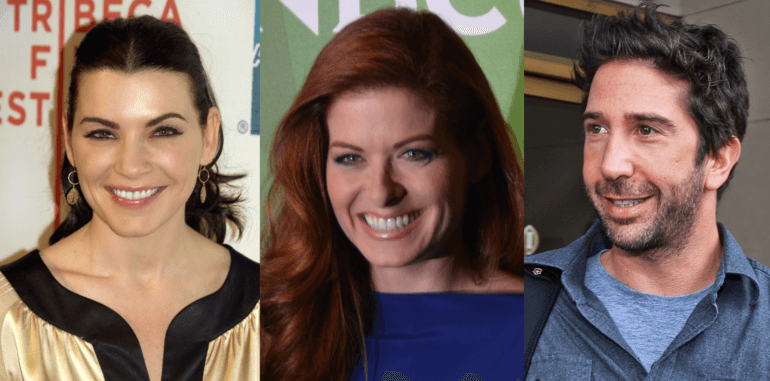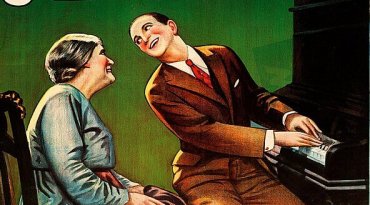
David Schwimmer, Debra Messing, Julianna Margulies and More Sign Jew in the City’s Historic Letter to Motion Picture Academy
Jew in the City — in connection with its Hollywood Bureau — has penned a letter to the Motion Picture Academy in an effort to get Jews included in Hollywood diversity. At this time, there are no guidelines to include Jews while there are regulations when it comes to other minority inclusion. The Motion Picture Academy’s Representation and Inclusion Standards simply, don’t consider Jews a minority that requires support.
The letter comes as a result of these new regulations and at a time when Jews are being persecuted in historical ways in American society. Many unfortunately believe that Jews don’t need to be included because as a group generally, often find success.
That being said, the Jewish story is one of persecution and one that is consistently written out of so many narratives. Often, Jewish stories you see on the big screen are those about the Holocaust. The others are of Jews leaving the faith or “toning down” their Judaism in some way. Television is full of tired tropes and caricatures. That is seemingly the only way one’s Jewish identity is accepted in Hollywood.
With the recent spike in antisemitism after October 7, pro-Palestinian rallies are against Jews as the “white oppressor.” When you see a neo-Nazi protest, Jews are not “white enough.”
Systemic racism against Jews in the US included segregation, redlining, quotas, gatekeeping, etc. and was the motivation for the founders of Hollywood to start an industry where antisemitism wouldn’t harm them, the letter reads. Many people don’t know, or forget about this history and why the industry was created in the first place.
Currently, celebrities such as Julianna Margulies and David Schwimmer have signed the letter. A full list of notable individuals who have signed is included here:
Amy Schumer
Brett Gelman
David Baddiel
David Schwimmer
Debra Messing
Josh Dallas
Josh Gad
Emanuelle Chriqui
Ginnifer Goodwin
Iliza Schlesinger
Jason Alexander
Jonathan Lipnicki
Juliana Margulies
Mark Feuerstein
Mayim Bialik
Michael Rapaport
Noa Tishby
Tiffany Haddish
Tracy Ann Oberman
Adam Glass
Adam Horowitz
Alec Sokolow
Alissa Vradenburg
Amy Sherman-Palladino
Andrew Stearn
Assaf Bernstein
Bob Bookman
Carmi Zlotnik
David Kohan
David Shaw
David Shore
Deborah Marcus
Edward Kitsis
Eric Tuchman
Eve Brandstein
Fernando Szew
Gail Berman
Gary Barber
Greg Berlanti
Halle K. Stanford
Hank Steinberg
Jacob Fenton
Jaime Eliezer Karas
Jason Newman
Jeremy Kagan
Joel Fields
Kevin Bright
KJ Steinberg
Lauren Abrahams
Laurie Seidman
Mara Maxfield
Marta Kauffman
Nancy Spielberg
Rhonda Price
Rick Senat
Robert Rovner
Sam Friedlander
Scott Rosenfelt
Steven Kane
Steven Levitan
Susan Rovner
Thor Freudenthal
To Sign the letter and see the full list, click here.
Read Below for the Full Letter To The Motion Picture Academy On Its Diversity Requirements:
We write as actors, directors, producers, executives, agents, screenwriters, and other industry professionals. While we applaud the Academy’s efforts to increase diverse and authentic storytelling, an inclusion effort that excludes Jews is both steeped in and misunderstands antisemitism. It erases Jewish peoplehood and perpetuates myths of Jewish whiteness, power, and that racism against Jews is not a major issue or that it’s a thing of the past.
While many mistakenly believe that Judaism is only a religion, Jews are actually an ethnic group, with varied spiritual practices that not all observe. Jews are an indigenous people to the Middle East with a continuous presence there for over 3000 years. This is not negated by the fact that Jews, like all marginalized groups, have white-passing members. Their colonization and exile led to millennia of persecution, and many Jews still carry the DNA of their foremothers’ oppressors. Antisemitic incidents are at an all-time high, with an increase of 400% since October 7–and Jews were already the most attacked minority group in the US per capita, according to the FBI 2022 hate crimes report. Online vitriol has also taken Jew-hatred to a new level. Cutting down perceived Jewish power has been an excuse for abusing Jews for centuries, most notably during the Spanish Inquisition and 1930s Germany.
Systemic racism against Jews in the United States included segregation, redlining, quotas, and gatekeeping, and was the motivation for the founders of Hollywood to start an industry where antisemitism wouldn’t harm them. Unfortunately, many of these founders had internalized shame and self-loathing, which meant that Jews in Hollywood often changed their names and told stories about Jews with caricatures, tropes, appropriation, and self-erasure. The first talkie film, “The Jazz Singer,” was about a Jew leaving the ways of his people. This dynamic is alive today, in films released as recently as this year. One of last year’s Oscar winners, “Everything Everywhere All At Once,” cast a Jewish woman to play a stereotypical “Jewish American Princess” called “Big Nose.”
The absence of Jews from “under-represented” groupings implies that Jews are over-represented in films, which is simply untrue. There are very few films about Jews, aside from ones about the Holocaust. Moreover, when Jewish characters are featured, they are often played by non-Jews, a rare practice for other marginalized groups. While there have always been Jews working in the industry, the industry has only accommodated a certain type of Jew: the toned-down Jew. A more flagrantly looking or observing Jew has never had a home in Hollywood. Even with today’s increased standards of inclusion and diversity, that Jew continues to not be welcome.
Jewish people being excluded from the Motion Picture Academy’s Representation and Inclusion Standards is discriminating against a protected class by invalidating their historic and genetic identity. This must be addressed immediately by including Jews in these standards. In addition, we’d like to propose further changes to the Representation and Inclusion Standards. When films use writers and consultants with expertise, pride, and cultural competency, when casting is done authentically, when film sets are set up to truly accommodate a diverse group of people, then a space of accommodation, inclusion and authenticity is created. These modifications would benefit everyone. A space like this has never existed for Jews in Hollywood, and the Motion Picture Academy has an opportunity to combat Jew-hatred by creating a framework for nuanced and authentic representation.
There is a duty for the entertainment world to do its part in disseminating whole and human depictions of Jews, to increase understanding and empathy in viewers in these dangerous times. We ask the Motion Picture Academy leadership to do its part in advancing a just cause that has been ignored for too long.
If you found this content meaningful and want to help further our mission through our Keter, Makom, and Tikun branches, please consider becoming a Change Maker today.








1 comment
Sort by
Some of the industry was started by Jewish men and women. If I’m not mistaken, MGM was founded by a man who changed his name to sound less Jewish.